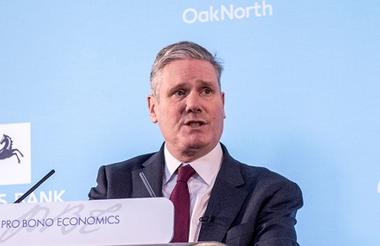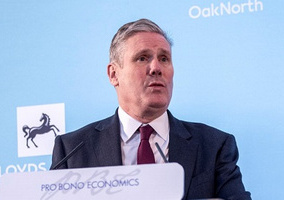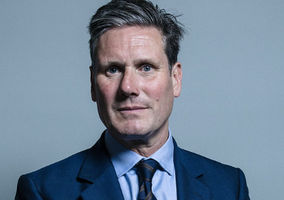It’s unlikely to have escaped your notice that we are in an election year. It’s therefore more important than ever for the voluntary sector to engage with all political parties to share our vision for society and the policies needed to achieve it.
While we’ve made strides recently engaging with the government, and have a strong advocate in civil society minister Stuart Andrew, the fallout of over a decade of austerity cannot be solved with a roundtable, or two.
So yesterday, I, along with a whole host of charity and voluntary sector colleagues, attended the Labour and Civil Society Summit in London.
It was a chance to set out our united stall and fly the flag for the vital work of charities and volunteers across the country. It was also, of course, a chance to explain how we think things can improve, how we can help, and what we need to be able to play our best role.
I’m sure some colleagues arrived feeling sceptical. And they’d be justified in feeling this. As so many in the room eloquently expressed – we’re tired, burnt out, and feeling undervalued. But I’d like to think that what Sir Keir and his team presented left even the biggest naysayers feeling tentatively hopeful.
Here’s what I heard…
All the right words
Perhaps the Labour team have been avidly reading Civil Society and therefore know what people working and volunteering in charities have been saying, because they echoed our words. Talk of partnership, co-creation, trust, and resets is exactly what needed to be heard in the room. Sir Keir’s vociferous rejection of the constant culture-wars-inspired attacks on charities is very much welcomed.
Being northern, I take people on face value. Yet these words didn’t appear hollow. As charities, our basic ask for any government is to work with us – on service design and delivery, to build compassion into policy making, so the challenges of those most unheard become heard.
But what’s crucial now is action.
We don’t need to wait until the votes are counted for that to happen. There are things that can be done pre-election to make sure words can quickly turn to delivery after polling day.
Which brings me on to my next point…
Promises of a genuine partnership
One of the challenges we can find hard to overcome when working with government is a perception of us being a “third” sector. Somehow less important, less relevant to achieving a government’s goals than the public or private sector. At best a cheap provider of services, at worst an annoyance pointing out all the things that are wrong about current policy.
Yesterday, I heard a commitment from Labour that the sector will be an equal partner. That we will be valued for calling out injustice. That we’ll be instrumental in delivering change.
But the truth of it is, saying “yes” before you’re in government is a lot easier than after you take office.
When it comes to balancing delivery of public services in partnership with the state and raising the voices of the communities we serve through campaigning, charities are often accused of biting the hand that feeds them.
We’ve more work to do with Labour to find a new way of doing things that is built upon a trusted relationship and offers a framework for being both a delivery partner and a critical friend – and crucially recognises the value of this dual role.
We know each other but are still putting faces to names
While charities have had relationships with Labour throughout their time in opposition, we have perhaps focused our limited resources more on the party in power. For their part, Labour have perhaps focused more on business relationships until recently. Labour’s consistent opinion poll leads mean there is now a clear need to think about how a future Labour government would collectively work with the sector.
But after yesterday it feels like the relationship between the sector and Labour is headed in the right direction. There is a great amount of charity experience in Labour’s team. They understand the challenges – they’ve worked on the frontline. It was evident yesterday that having five missions clearly set out gives the voluntary sector a framework in which to meaningfully engage and share our expertise.
It was really reassuring to hear small charities platformed in the room. Sir Keir talked about a community wrestling club, and Thangam Debbonaire, shadow culture secretary, spoke about a local group of parents campaigning for a better park. They know that for long-term systemic change we must work with people who know their communities best.
Tackling the challenges head on
One of the mantras we’ve become used to hearing from government and opposition alike is: “Tell us the things we can do that don’t cost any money.”
While I do not think we should accept this at face value – spending money on the often-preventative work of the voluntary sector should be regarded as an investment not a cost – the reality is that the economic climate is as tough as it has been for decades.
For the voluntary sector, an inflationary climate, like austerity politics before it, has a double impact. It creates additional need in communities we serve, and it squeezes our resources making us less able to respond. If we are to play our part in serving communities alongside any future government, there must be recognition that the sector is depleted yet, in many cases, also doing the job of the state.
We heard recognition of this reality yesterday. Especially from shadow civil society minister Lilian Greenwood who clearly stated “we are with you” in her closing remarks. Similarly, we were told by Sir Keir that “you have held up your end of the social contract”.
A focus on the long-term
Talk to anyone at yesterday’s summit and there’s one thing we probably all heard: “This is just the start of the conversation.”
That commitment to an ongoing conversation is really promising. The summit was a great, but limited, platform for us to share the nuances and complexities of the challenges we’ll be facing together if Labour win at the next election.
We also heard recognition from Labour yesterday that achieving lasting change that tackles causes not symptoms is a long-term project. Putting the obvious party politics aside, there is a lot here we can get on board with. This is the sort of change that would mean charities delivering sticking plasters such as emergency food and shelter can achieve their aim of putting themselves out of business.
Delivering this is going to take bravery. It’s a tide that won’t turn easily. But to continue in the conversation is to understand, respect and commit to the voluntary sector’s essential role in achieving long term change. It is going to take tough conversations, and at NCVO we welcome these, in the run up to the election and beyond.
I want to finish with the words of Paul Brown, CEO of YMCA Leicestershire, who during the final panel of the day made a plea to Labour if they do get into government. “Please talk to us. We’ll still be there, at the coal face, with our sleeves rolled up, and ready.”













